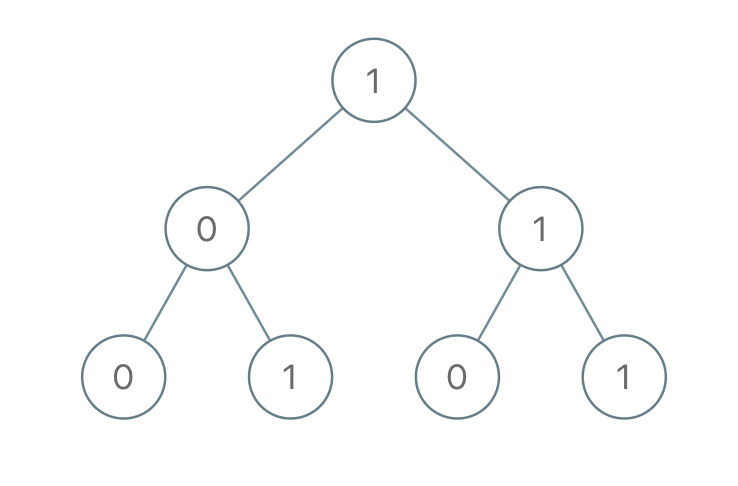Welcome to Subscribe On Youtube
1022. Sum of Root To Leaf Binary Numbers
Description
You are given the root of a binary tree where each node has a value 0 or 1. Each root-to-leaf path represents a binary number starting with the most significant bit.
- For example, if the path is
0 -> 1 -> 1 -> 0 -> 1, then this could represent01101in binary, which is13.
For all leaves in the tree, consider the numbers represented by the path from the root to that leaf. Return the sum of these numbers.
The test cases are generated so that the answer fits in a 32-bits integer.
Example 1:

Input: root = [1,0,1,0,1,0,1] Output: 22 Explanation: (100) + (101) + (110) + (111) = 4 + 5 + 6 + 7 = 22
Example 2:
Input: root = [0] Output: 0
Constraints:
- The number of nodes in the tree is in the range
[1, 1000]. Node.valis0or1.
Solutions
DFS.
-
/** * Definition for a binary tree node. * public class TreeNode { * int val; * TreeNode left; * TreeNode right; * TreeNode() {} * TreeNode(int val) { this.val = val; } * TreeNode(int val, TreeNode left, TreeNode right) { * this.val = val; * this.left = left; * this.right = right; * } * } */ class Solution { public int sumRootToLeaf(TreeNode root) { return dfs(root, 0); } private int dfs(TreeNode root, int t) { if (root == null) { return 0; } t = (t << 1) | root.val; if (root.left == null && root.right == null) { return t; } return dfs(root.left, t) + dfs(root.right, t); } } -
/** * Definition for a binary tree node. * struct TreeNode { * int val; * TreeNode *left; * TreeNode *right; * TreeNode() : val(0), left(nullptr), right(nullptr) {} * TreeNode(int x) : val(x), left(nullptr), right(nullptr) {} * TreeNode(int x, TreeNode *left, TreeNode *right) : val(x), left(left), right(right) {} * }; */ class Solution { public: int sumRootToLeaf(TreeNode* root) { return dfs(root, 0); } int dfs(TreeNode* root, int t) { if (!root) return 0; t = (t << 1) | root->val; if (!root->left && !root->right) return t; return dfs(root->left, t) + dfs(root->right, t); } }; -
# Definition for a binary tree node. # class TreeNode: # def __init__(self, val=0, left=None, right=None): # self.val = val # self.left = left # self.right = right class Solution: def sumRootToLeaf(self, root: TreeNode) -> int: def dfs(root, t): if root is None: return 0 t = (t << 1) | root.val if root.left is None and root.right is None: return t return dfs(root.left, t) + dfs(root.right, t) return dfs(root, 0) -
/** * Definition for a binary tree node. * type TreeNode struct { * Val int * Left *TreeNode * Right *TreeNode * } */ func sumRootToLeaf(root *TreeNode) int { var dfs func(root *TreeNode, t int) int dfs = func(root *TreeNode, t int) int { if root == nil { return 0 } t = (t << 1) | root.Val if root.Left == nil && root.Right == nil { return t } return dfs(root.Left, t) + dfs(root.Right, t) } return dfs(root, 0) } -
/** * Definition for a binary tree node. * class TreeNode { * val: number * left: TreeNode | null * right: TreeNode | null * constructor(val?: number, left?: TreeNode | null, right?: TreeNode | null) { * this.val = (val===undefined ? 0 : val) * this.left = (left===undefined ? null : left) * this.right = (right===undefined ? null : right) * } * } */ function sumRootToLeaf(root: TreeNode | null): number { const dfs = (root: TreeNode | null, num: number) => { if (root == null) { return 0; } const { val, left, right } = root; num = (num << 1) | val; if (left == null && right == null) { return num; } return dfs(left, num) + dfs(right, num); }; return dfs(root, 0); } -
// Definition for a binary tree node. // #[derive(Debug, PartialEq, Eq)] // pub struct TreeNode { // pub val: i32, // pub left: Option<Rc<RefCell<TreeNode>>>, // pub right: Option<Rc<RefCell<TreeNode>>>, // } // // impl TreeNode { // #[inline] // pub fn new(val: i32) -> Self { // TreeNode { // val, // left: None, // right: None // } // } // } use std::rc::Rc; use std::cell::RefCell; impl Solution { fn dfs(root: &Option<Rc<RefCell<TreeNode>>>, mut num: i32) -> i32 { if root.is_none() { return 0; } let root = root.as_ref().unwrap().borrow(); num = (num << 1) | root.val; if root.left.is_none() && root.right.is_none() { return num; } Self::dfs(&root.left, num) + Self::dfs(&root.right, num) } pub fn sum_root_to_leaf(root: Option<Rc<RefCell<TreeNode>>>) -> i32 { Self::dfs(&root, 0) } }